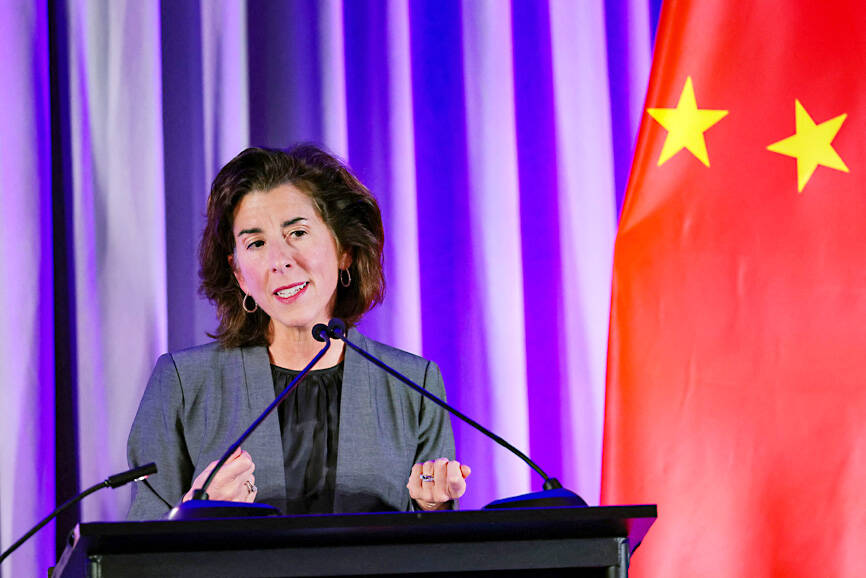The US Department of Commerce on Thursday said it would launch a survey of the US semiconductor supply chain and national defense industrial base to address national security concerns from Chinese-sourced chips.
The survey aims to identify how US companies are sourcing so-called legacy chips — current-generation and mature-node semiconductors — as the department moves to award nearly US$40 billion in subsidies for semiconductor chip manufacturing.
The department said the survey, which would begin next month, aims to “reduce national security risks posed by” China and would focus on the use and sourcing of Chinese-manufactured legacy chips in the supply chains of critical US industries.

Photo: Reuters
A report released by the department on Thursday said Beijing has provided the Chinese semiconductor industry with an estimated US$150 billion in subsidies in the past decade, creating “an unlevel global playing field for US and other foreign competitors.”
“Over the last few years, we’ve seen potential signs of concerning practices from [China] to expand their firms’ legacy chip production and make it harder for US companies to compete,” US Secretary of Commerce Gina Raimondo said.
China’s embassy in Washington said that the US “has been stretching the concept of national security, abusing export control measures, engaging in discriminatory and unfair treatment against enterprises of other countries, and politicizing and weaponizing economic and sci-tech issues.”
Raimondo last week said that she expects her department to make about a dozen semiconductor chip funding awards within the next year, including multibillion-dollar announcements that could drastically reshape US chip production.
Her department made the first award from the program on Monday last week.
The survey would also help promote a level playing field for legacy chip production, the department said.
“Addressing non-market actions by foreign governments that threaten the US legacy chip supply chain is a matter of national security,” Raimondo added.
US-headquartered companies account for about half of global semiconductor revenue, but face intense competition supported by foreign subsidies, the department said.
Its report said the cost of manufacturing semiconductors in the US might be “30 to 45 percent higher than the rest of the world” and it called for long-term support for domestic fabrication construction.
The US should enact “permanent provisions that incentivize steady construction and modernization of semiconductor fab facilities, such as the investment tax credit scheduled to end in 2027,” the report added.

SEMICONDUCTORS: The German laser and plasma generator company will expand its local services as its specialized offerings support Taiwan’s semiconductor industries Trumpf SE + Co KG, a global leader in supplying laser technology and plasma generators used in chip production, is expanding its investments in Taiwan in an effort to deeply integrate into the global semiconductor supply chain in the pursuit of growth. The company, headquartered in Ditzingen, Germany, has invested significantly in a newly inaugurated regional technical center for plasma generators in Taoyuan, its latest expansion in Taiwan after being engaged in various industries for more than 25 years. The center, the first of its kind Trumpf built outside Germany, aims to serve customers from Taiwan, Japan, Southeast Asia and South Korea,

Gasoline and diesel prices at domestic fuel stations are to fall NT$0.2 per liter this week, down for a second consecutive week, CPC Corp, Taiwan (台灣中油) and Formosa Petrochemical Corp (台塑石化) announced yesterday. Effective today, gasoline prices at CPC and Formosa stations are to drop to NT$26.4, NT$27.9 and NT$29.9 per liter for 92, 95 and 98-octane unleaded gasoline respectively, the companies said in separate statements. The price of premium diesel is to fall to NT$24.8 per liter at CPC stations and NT$24.6 at Formosa pumps, they said. The price adjustments came even as international crude oil prices rose last week, as traders

Taiwan Semiconductor Manufacturing Co (TSMC, 台積電), which supplies advanced chips to Nvidia Corp and Apple Inc, yesterday reported NT$1.046 trillion (US$33.1 billion) in revenue for last quarter, driven by constantly strong demand for artificial intelligence (AI) chips, falling in the upper end of its forecast. Based on TSMC’s financial guidance, revenue would expand about 22 percent sequentially to the range from US$32.2 billion to US$33.4 billion during the final quarter of 2024, it told investors in October last year. Last year in total, revenue jumped 31.61 percent to NT$3.81 trillion, compared with NT$2.89 trillion generated in the year before, according to

PRECEDENTED TIMES: In news that surely does not shock, AI and tech exports drove a banner for exports last year as Taiwan’s economic growth experienced a flood tide Taiwan’s exports delivered a blockbuster finish to last year with last month’s shipments rising at the second-highest pace on record as demand for artificial intelligence (AI) hardware and advanced computing remained strong, the Ministry of Finance said yesterday. Exports surged 43.4 percent from a year earlier to US$62.48 billion last month, extending growth to 26 consecutive months. Imports climbed 14.9 percent to US$43.04 billion, the second-highest monthly level historically, resulting in a trade surplus of US$19.43 billion — more than double that of the year before. Department of Statistics Director-General Beatrice Tsai (蔡美娜) described the performance as “surprisingly outstanding,” forecasting export growth